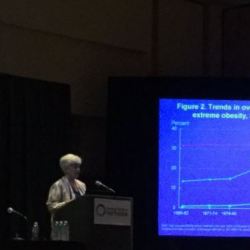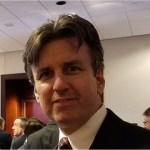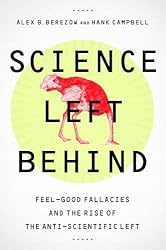
1. We actually had to debate if the pizza or the the box causes obesity at the International Association for Food Protection meeting in Tampa, Florida and no one was better equipped to handle the pizza side than our Senior Fellow in Nutrition, Dr. Ruth Kava.
It's not as ridiculous as it sounds, this is part of the clever kind of thought experiment IAFP does at their meetings, and there are a lot of people who think the chemicals in the box are achieving some sort of magical effect in biology or toxicology.
In the wide, weird world of weak observational studies, there probably is a paper claiming the box is the reason people get fat eating a lot of pizza.
Obviously we won, but Professor Stephen Safe, bioorganic chemist at Texas A&M, did terrific on point arguing for the box. He didn't believe it but he was hilarious and took the Box believers from 13 percent before the debate to 32 percent after.
Chemophobia is real. Hockey sticks can't lie, people; that's why so many people link organic food to autism. The audience probably learned a lot about the flaws in epidemiology by seeing how cleverly he used it.
It almost makes us want to be more sympathetic to members of the audience who read the latest weird claim in the New York Times that scary-sounding yet harmless pthalates in macaroni and cheese might cause disease in kids. Though an experienced journalist really should have known better.
Because they had scientists there, and corporate sponsors, look for groups like Sourcewatch and Center for Science in the Public Interest to declare the IAFP is in cahoots with Big Pizza.
2. On Science 2.0, I took organic industry-funded merchant of doubt Paul Thacker, formerly a journalist, whose attacks on other journalists in order to defend Organic Consumers Association led to an article of his being retracted, to task for publishing more lies about our scientists and doctors. His only source for his bizarre conspiracy tale is the group paying him, which got an environmental lawyer to mention us in an obscure legal document, which they got published everywhere from Progressive to Russia Today, the propaganda arm of the Kremlin.
Sorry, Paul, science is not a conservative conspiracy. If the group who are against you and your work happen to be more pro-science, stop being a shill and learn some biology.
3. But Thacker was not alone, he was simply in collusion. In Bloomberg Businessweek a team of four lazy journalists probably were not in collusion, they just did no fact-checking and repeated the claims they read in Progressive or Huffington Post blogs or whatever environmental activist sites they think are science sources. These journalists are rabidly anti-Monsanto and so are willing to believe anything if it can make that company look bad. It's terrible critical thinking to repeat claims with no fact-checking of any kind but since this probably survived three layers of editing at Bloomberg and there is no Public Editor or Ombudsman there, a Letter to the Editor would just get laughed at.
I am sure the organic food advertisements are already rolling in.
4. In New York, Dr. Julianna LeMieux was part of the Atlas Obscura Real/Fake Science event, where the audience has to try and figure out if they are hearing facts or alternative facts, like if it's us or science they might read in Bloomberg.
In Brooklyn's Union Hall, Julianna and five others, some scientists and some charlatans, discussed six topics, some fabricated and some factual.
They correctly guessed she was a scientist during the question period, though. Her answers were too good. She can't even fake not being a scientist. That's how much of a scientist she is.
5. In Encore, "your weekly alternative voice" (yes, there are alternative publications that are not anti-science, though all of the really big ones like Mother Jones are) they wrote:
We’re all built to believe. We evolved to tell and believe stories. Science historian, founder of Skeptic magazine, advisor to American Council on Science and Health, and former professional long-distance cyclist, and Lance debunker, Michael Shermer writes, “Humans are pattern-seeking, storytelling animals, and we are quite adept at telling stories about patterns whether they exist or not.”
No one is immune. Liberals believed the story of the first black president riding off into a glorious sunset after handing the keys to the shining city on the hill to the first woman president. Despite being a story the majority of America voted for, it will be forever consigned to the discount bin of liberal fantasy/fiction.
And Lance Armstrong too. They get it all in there.



